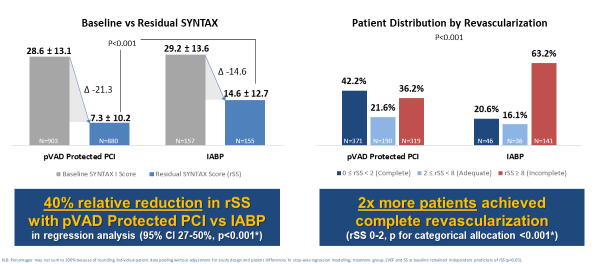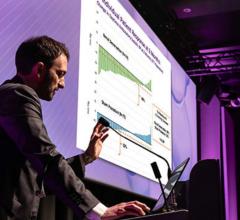
May 19, 2023 — Abiomed, part of Johnson & Johnson MedTech[1], announces results of a third-party analysis showing that utilizing Impella during high-risk percutaneous coronary intervention (PCI) procedures may help physicians achieve a more complete revascularization compared to high-risk PCIs supported using an intra-aortic balloon pump (IABP). Previous studies have shown that a more complete revascularization can lead to longer survival[2],[3], a greater reduction in heart failure and angina symptoms[4], and an improved quality of life for the patient[5].
This analysis shows more patients achieved a more complete revascularization with Impella than with IABP support during high-risk PCIs (see Figure 1; p for categorical allocation <0.001). Vasileios Panoulas[6], MD, FRCP, PhD, FESC, consultant interventional cardiologist, Royal Brompton and Harefield hospitals, presented this data during EuroPCR 2023, the annual meeting of the European Association of Percutaneous Cardiovascular Interventions (EAPCI), which took place in Paris, France, from May 16-19, 2023.
The PROTECT II Randomized Controlled Trial (RCT), PROTECT III and RESTORE-EF prospective studies were included in this analysis and individual patient data were pooled between these three studies. Coronary artery disease severity was measured pre-PCI using SYNTAX score[7] and post-PCI using residual SYNTAX Score (rSS)[8]. The analysis compared complete revascularization rates, as measured by rSS<2, between high-risk PCI patients who received Impella support (N=880) and IABP support (N=155).
Results of a multiple regression analysis showed a 40% greater reduction of residual SYNTAX Score post-PCI in patients treated with Impella compared to IABP (95% CI 27-50%, p<0.001). Defining complete revascularization (CR) as rSS<2, CR was achieved in 42.2% of Impella patients vs. 20.6% of IABP patients. “When taking study limitations into account, this pooled analysis showcases the potential of Impella to contribute to improved long-term patient outcomes by allowing a greater extent and quality of revascularization,” said Panoulas.
Previous studies have shown that a more complete revascularization is associated with longer patient survival and patients with residual SYNTAX Score >8 were associated with 37% all-cause mortality at five years against 9% for rSS=0 (HR=5.12, 95% CI 3.32-7.90, P<0.001)[9]. In other meta-analyses, rSS=0 was associated with 29% lower all-cause mortality (p=0.001) and 25% fewer major adverse events (p<0.001)[10].
This analysis supports the hypotheses incorporated in the ongoing PROTECT IV RCT. PROTECT IV is an on-label, prospective, multi-center RCT designed to provide the level of clinical evidence needed to achieve a global Class I guideline recommendation for Impella in high-risk PCI in the future.
The pooled data analysis was led by the York Health Economics Consortium (YHEC), an independent research company owned by the University of York (England).
For more information: www.abiomed.com
References:
[1] Abiomed, Inc. is part of Johnson & Johnson MedTech, which comprises the surgery, orthopedics, vision and interventional solutions businesses within Johnson & Johnson's MedTech segment.
2 Garcia S, Sandoval Y, Roukoz H, et al. Outcomes after complete versus incomplete revascularization of patients with multivessel coronary artery disease: a meta-analysis of 89,883 patients enrolled in randomized clinical trials and observational studies. J Am Coll Cardiol 2013;62:1421-31.
3 Nagaraja V, Ooi SY, Nolan J, et al. Impact of Incomplete Percutaneous Revascularization in Patients With Multivessel Coronary Artery Disease: A Systematic Review and Meta-Analysis. J Am Heart Assoc 2016;5.
4 National Institute of Health and Care Excellence. Stable Angina: Management. Clinical Guideline [CG126]. NICE, 2011. Available from https://www.nice.org.uk/guidance/cg126/chapter/Guidance#investigation-and-revascularisation. Accessed on May 12, 2023.
5 Mehta SR, Wang J, Wood DA, et al. Complete Revascularization vs Culprit Lesion-Only Percutaneous Coronary Intervention for Angina-Related Quality of Life in Patients With ST-Segment Elevation Myocardial Infarction: Results From the COMPLETE Randomized Clinical Trial. JAMA Cardiol 2022;7:1091-1099.
6 Dr. Panoulas has received consulting fees and honoraria from Abiomed, Inc.
7 Sianos G, Morel MA, Kappetein AP, et al. The SYNTAX Score: an angiographic tool grading the complexity of coronary artery disease. EuroIntervention 2005;1:219-27.
8 Genereux P, Palmerini T, Caixeta A, et al. Quantification and impact of untreated coronary artery disease after percutaneous coronary intervention: the residual SYNTAX (Synergy Between PCI with Taxus and Cardiac Surgery) score. J Am Coll Cardiol 2012;59:2165-74.
9 Farooq V et al. Quantification of incomplete revascularization and its association with 5-year mortality in the SYNTAX trial validation of the residual SYNTAX score. Circulation 2013;128:141-51.
10 Ahn JM et al. Comparison of Stenting Versus Bypass Surgery According to the Completeness of Revascularization in Severe Coronary Artery Disease: Patient-Level Pooled Analysis of the SYNTAX, PRECOMBAT, and BEST Trials. JACC Cardiovasc Interv 2017;10:1415-1424.


 May 30, 2024
May 30, 2024 




